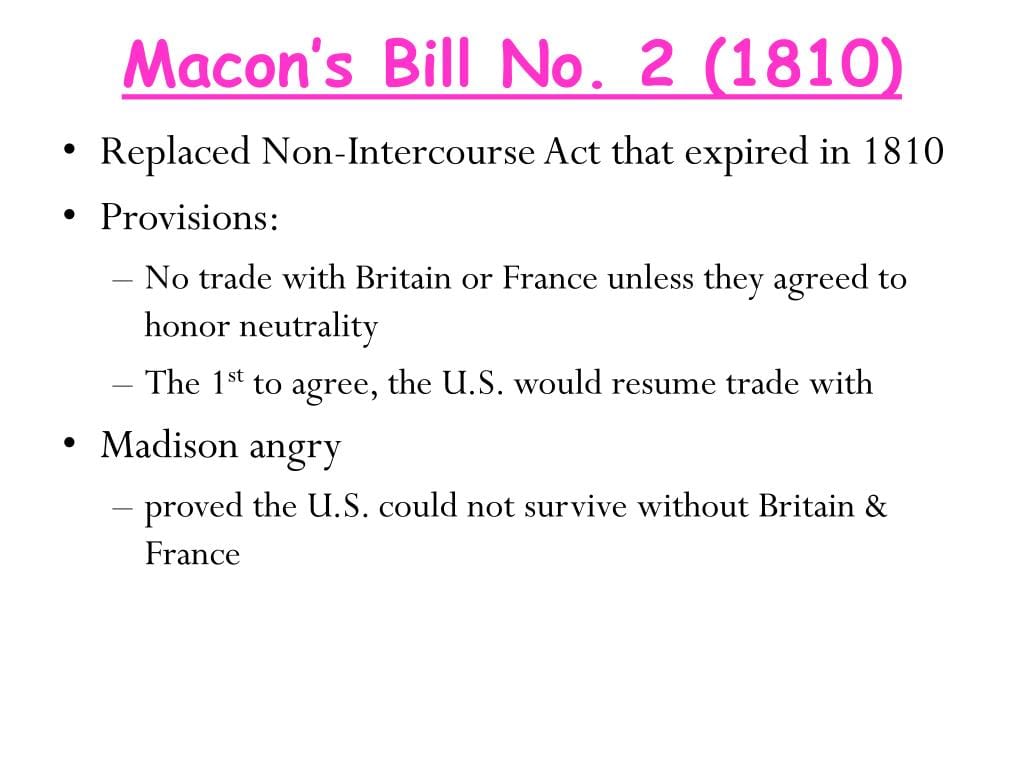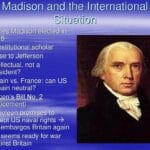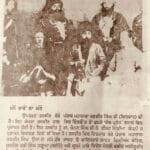The young United States, barely a generation removed from its revolutionary struggle, found itself caught in a global maelstrom. The Napoleonic Wars raged across Europe, and the mighty British Empire, locked in a life-or-death struggle with Napoleon, showed little regard for American sovereignty on the high seas. American merchant ships, attempting to navigate the treacherous waters of neutrality, were routinely seized by both the British and the French. In 1810, hoping to avert war and protect American commerce, Congress passed Macon’s Bill No. 2, a piece of legislation that, despite its good intentions, may have inadvertently paved the path to war with Great Britain.
A Nation’s Gambit: The Origins of Macon’s Bill No. 2
The genesis of Macon’s Bill No. 2 lay in the ashes of failed attempts to protect American shipping. The Embargo Act of 1807, a drastic measure that forbade American ships from sailing to foreign ports, had crippled the American economy without significantly altering British or French policy. Its replacement, the Non-Intercourse Act of 1809, proved only marginally more effective. By 1810, the American public and its representatives in Congress clamored for a new approach. Macon’s Bill No. 2, named for Congressman Nathaniel Macon of North Carolina, offered a seemingly ingenious solution: a conditional reopening of trade with both Britain and France, coupled with the threat of a renewed embargo against whichever power first ceased its attacks on American shipping. It was a gamble, a diplomatic tightrope walk designed to coerce the warring European powers into respecting American neutrality.
Napoleon’s Deception: A Trap Set for a Young Republic
Napoleon Bonaparte, the shrewd and ambitious Emperor of France, recognized an opportunity to exploit the young republic’s precarious position. In a calculated move, he offered to revoke the Berlin and Milan Decrees, which had crippled American trade with Britain, if the United States would enforce an embargo against the British. President James Madison, eager to avoid war, accepted Napoleon’s offer, perhaps too readily. In 1811, the United States reinstated the embargo against Great Britain, effectively taking sides in the Napoleonic conflict. This decision, seen by many in Britain as a betrayal, would have dire consequences.
Britain’s Defiance: The Road to War Paved with Good Intentions
Great Britain, facing an existential threat from Napoleon, refused to be swayed by American economic pressure. The British government, viewing American trade with France as aiding their enemy, refused to repeal its Orders in Council, which restricted American trade. Furthermore, they continued the practice of impressment, forcibly conscripting American sailors into the Royal Navy. These actions, combined with the perceived slight of Madison’s embargo, inflamed anti-British sentiment in the United States.
The Legacy of Macon’s Bill No. 2: A Step Towards War?
Macon’s Bill No. 2, intended as an instrument of peace, ultimately backfired. Instead of achieving its objective of securing American neutrality and protecting its maritime commerce, the bill exacerbated tensions with Great Britain and pushed the two nations closer to war. Some historians suggest that Napoleon’s duplicity was the decisive factor, while others point to the inherent flaws in the bill itself. What remains undisputed is that Macon’s Bill No. 2, however well-intentioned, became another stepping stone on the road to the War of 1812.
The Irony of Dissent: Nathaniel Macon’s Opposition
Ironically, Nathaniel Macon himself opposed the final version of the bill that bore his name. He viewed it as too weak and likely ineffective. He abstained from voting on its passage, a testament to the complexities of the legislative process and the evolving political climate of the time. hanai meaning This detail adds another layer to the story, highlighting the internal divisions within the American government as it grappled with the challenges of neutrality in a world at war.
Assessing the Damage: Long-Term Consequences
The failure of Macon’s Bill No. 2 and the subsequent War of 1812 had profound consequences for the United States. The war, though costly and ultimately inconclusive, fostered a sense of national unity and solidified American independence. The conflict also shaped future American foreign policy, emphasizing the importance of maintaining a strong navy and asserting American interests on the global stage.
Unanswered Questions: Ongoing Historical Inquiry
The story of Macon’s Bill No. 2 remains a subject of ongoing historical research. Scholars continue to explore the motivations of the key players, the political pressures of the era, and the complex interplay of international diplomacy and economic coercion. While we may never have all the answers, the story of Macon’s Bill No. 2 serves as a cautionary tale about the unpredictable nature of international relations and the unintended consequences of even the most well-meaning political strategies. It reminds us that history is rarely simple, and its lessons often remain relevant centuries later.
- Crypto Quotes’ Red Flags: Avoid Costly Mistakes - June 30, 2025
- Unlock Inspirational Crypto Quotes: Future Predictions - June 30, 2025
- Famous Bitcoin Quotes: A Deep Dive into Crypto’s History - June 30, 2025
















